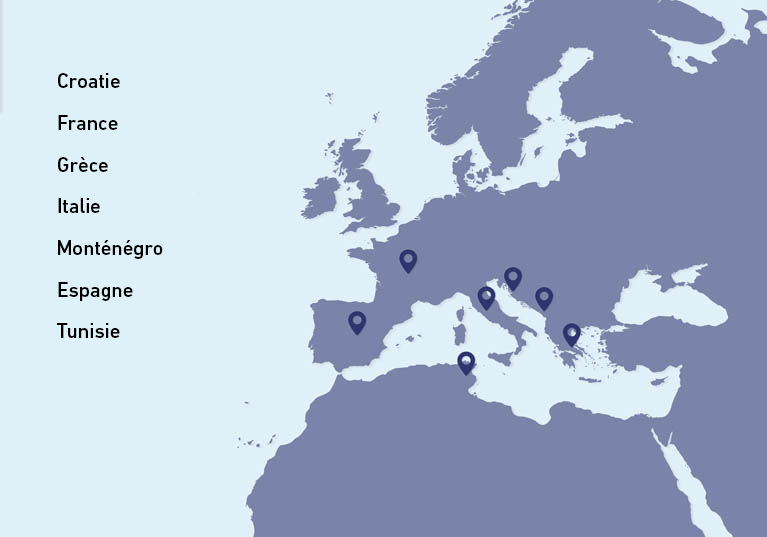
MedCoast4BG – Med Coasts for Blue Growth
Context and objectives
Over the course of a 3-year period, the project MedCoast4BG aims to find common approaches and planning tools to boost sustainable coastal and maritime tourism in the Mediterranean, by promoting the co-development of human activities and natural ecosystems. The project takes into consideration the principles of sustainable development, the effects of climate change, and governance tools such as Integrated Coastal Zone Management (ICZM) and Maritime Spatial Planning (MSP).
This project extends the model of the EU-funded Co-Evolve Interreg Med project, which focused on EU Mediterranean coasts, to Southern & Eastern Mediterranean countries, taking into account common (at Mediterranean level) and diverse (at the local level) natural, physical and geographic characteristics. This analysis is complemented by a quantitative evaluation of “tourism sustainability” in Pilot Areas. The final results will be sustainable, tourism-driven and tourism-oriented action plans that:
- demonstrate the feasibility and effectiveness of a planning process that follows ICZM/MSP principles.
- show the importance of local stakeholders’ engagement on key issues for sustainable coastal tourism development.
- prepare for the implementation of concrete actions for tourism development, such as recovery of beach dunes, dredging with sediment reuse for nourishment, lodging prototypes, differentiated and de-seasonal touristic offer, etc. (prepared by local task forces).
- Analyse and promote the co-development of human activities and natural systems in coastal areas devoted to tourism.
- Create conditions for development of coastal areas that is oriented towards safety, protection, wellness and sustainability.
- Use marine spatial planning as a governance and adaptation tool with regards to the impacts of climate change.
Location

Key figures
Duration:
2018‐2020
Countries:
7
Total cost:
€ 3.085M
Partners:
12
Promoter
The lead promoter of this project is CPMR Intermediterranean Commission.
Financial contribution
Approximately € 2.2 million funding contribution is given by the Co‐Evolve project, funded by the European Regional Development Fund and by the partners’ own resources.
Key partners
Beneficiaries
Public administrations, private operators, citizens of coastal areas across the Mediterranean, and research institutions and universities will benefit from this project, as well as international organizations and networks.
Key actions
MedCoast4BG – Med Coasts for Blue Growth operates through 5 main actions:
Analysis of threats to and enabling factors for sustainable tourism at the Mediterranean and local levels (7 pilot areas).
Use of adapted set of selected sustainable indicators.
Indications on strategic planning for pilot areas.
Formulation of local Action Plans through participatory processes with stakeholders.
Collection of relevant data.
Results at Mediterranean level
Studies and analysis reports on threats to and enabling factors for the co‐development of human activities (tourism industry) and natural ecosystems in coastal areas.
Development of Portals, Interoperable Databases, and Decision Support Tools at the Mediterranean level (and at a local level for pilot areas).
Set basis for a Mediterranean Joint Observatory on coastal erosion and sediment resources, and “best practices” in coastal adaptation and sustainable tourism.
Results at local level
The main results will be specific Integrated Plans for sustainable tourism development and for the protection, management and adaptation of coastal areas. These plans will contribute to the following aims:
Developing a knowledge base of coastal and marine areas.
Following an ecosystem-based approach.
Increasing coastal systems’ resilience.
Incorporating considerations of the risk and cost of coastal erosion in planning and investment decisions.
Identifying opportunities and fostering sustainable economic and tourism-related activities and job creation.
Setting conditions for and supporting the design and implementation of coastal adaptation interventions, on the basis of ICZM and MSP principles.
Identifying ecosystem-based solutions for coastal adaptation to climate change, including limited interventions, “building with nature”, etc.
